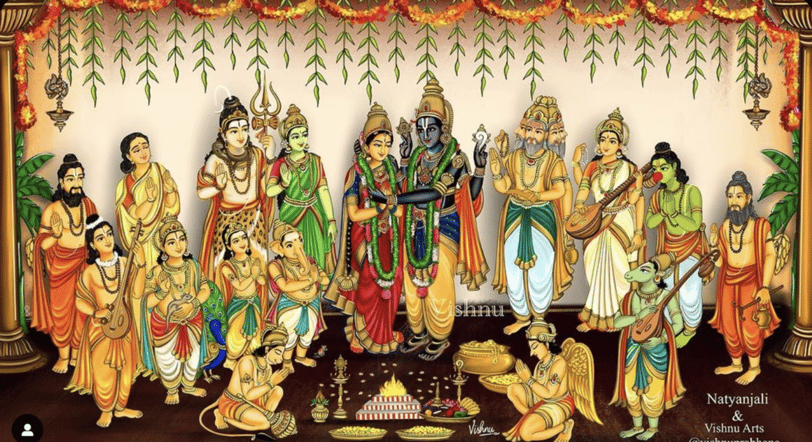Vedanta
A Deep Dive into Thiruppavai Pasuram 30: "Paavai Maalai"
Thiruppavai, composed by the saint-poet Andal, is a beautiful and profound collection of 30 hymns that express deep devotion to Lord Vishnu. The verses of Thiruppavai are sung during the Tamil month of Margazhi (mid-December to mid-January) in temples and homes, and they are rich in spiritual meaning, philosophical insights, and the essence of devotion. Among these verses, Pasuram 30 is the final one and holds a special significance in the journey of devotion that Andal takes us through.
Madhavi Marri
1/14/20253 min read


The Setting of Thiruppavai
Before diving into Pasuram 30, it’s important to understand the context of Thiruppavai as a whole. The poem is a direct conversation between Andal and the Divine, where she addresses the Lord as a loving daughter, full of love, reverence, and longing for His grace. The verses depict Andal’s intense devotion and the journey of a seeker who embarks on a spiritual quest.
In Pasuram 1, Andal begins by invoking the blessings of the Lord and calls upon her friends to join in a collective prayer to seek His mercy. As we move through the Pasurams, Andal guides us through various stages of devotion: seeking the Lord's grace, surrendering to His will, experiencing His beauty, and finally, attaining a deep connection with Him.
Pasuram 30: The Conclusion and Fulfillment of Devotion
Pasuram 30 is the final verse of the Thiruppavai, where Andal brings her beautiful prayer to a culmination. It marks the end of the 30-day spiritual journey that she takes her readers through. The entire Thiruppavai is a journey from seeking divine grace to finally receiving it, and Pasuram 30 celebrates this moment of fulfillment.
Here’s the full verse:
"பெரியவாளே! உன்னுள் பிறந்த நமக்கே, அருள்செய் தாமரைக்கண்ணனே! நீராராய் சென்று நெஞ்சமே நல்வாழ்த்தி, வாழ்கின்ற ஊர்க்குழலரே! என் அன்பின் அப்பனே! துறந்திருக்கின்றவனே! துதிக்கின்றவரை காணாதே!"
Key Themes in Pasuram 30
1. Devotion Reaching Fulfillment
Pasuram 30 is the poetic expression of Andal's devotion reaching its zenith. She realizes that by sincerely dedicating herself to the Lord, she has received His grace and has fully realized His divine presence. This final verse reflects her absolute trust and surrender to Him.
In this pasuram, Andal says that the Lord, who is the ultimate source of light and wisdom, has been born to deliver His devotees. The culmination of the 30-day prayer is not just a ceremonial completion, but a moment of realization — the Lord has answered all her prayers.
2. The Role of Divine Grace
The concept of divine grace is a recurring theme throughout the Thiruppavai. In Pasuram 30, Andal reflects on the Lord's grace in bringing her closer to the ultimate realization. By invoking "Thamarai Kannan" (Lotus-eyed Lord), she is expressing the beauty and sweetness of Lord Vishnu. The reference to the Lord's lotus-like eyes represents His divine vision, which brings peace and liberation.
3. The Call for Surrender and Joy
In this final verse, Andal reflects on the profound joy of surrendering oneself completely to the Lord. Her call is not one of despair but of unending hope and devotion. She encourages the reader to join her in surrender, as this act leads to ultimate happiness and spiritual fulfillment.
The Connection Between Pasuram 30 and the Larger Theme of Thiruppavai
The entire Thiruppavai can be seen as a spiritual journey, and Pasuram 30 represents the culmination of this journey. Throughout the previous 29 verses, Andal has expressed longing, devotion, and the desire to serve the Lord. But it’s only in Pasuram 30 that she achieves spiritual fulfillment, having gained the Lord's grace. This mirrors the overall spiritual philosophy of the Bhakti movement: the path of devotion leads to the complete surrender to God, which ultimately brings peace, fulfillment, and liberation.
The verse also brings to light another important element: the need for collective devotion. Andal calls her friends and fellow devotees to join her, signifying that true devotion is not solitary but involves the collective spirit of community. It reflects the idea that the Lord's grace can be achieved when the community comes together in worship, prayer, and service.
Relevance of Pasuram 30 Today
The teachings of Pasuram 30 remain timeless, as they speak to the universal human pursuit of spiritual fulfillment and peace. In today’s fast-paced, materialistic world, Thiruppavai offers a blueprint for reconnecting with our higher selves and rediscovering the essence of devotion and grace. Pasuram 30 reminds us that true happiness and spiritual fulfillment come from surrendering our ego and trusting in the divine.
Moreover, the verses provide a comforting assurance that no matter what stage we are at in our spiritual journey, divine grace is always available. Andal’s voice in Pasuram 30 acts as a reminder that we are all part of a larger divine plan, and by walking the path of devotion, we too can experience the peace and fulfillment that comes from being in harmony with the Lord.
Conclusion
Pasuram 30 of Thiruppavai is the epitome of Andal’s deep and sincere devotion. It is a prayer of fulfillment, a celebration of divine grace, and a call for spiritual surrender. Through this beautiful verse, Andal encourages us to devote ourselves wholeheartedly to the divine and trust that grace will come to us in abundance.
As we read these powerful words, we are reminded that the ultimate goal of life is to cultivate a relationship with the Divine — one of love, surrender, and joy. The 30 verses of Thiruppavai guide us step by step towards that goal, and Pasuram 30 is the glorious conclusion that reinforces the power of devotion and the joy that it brings.
